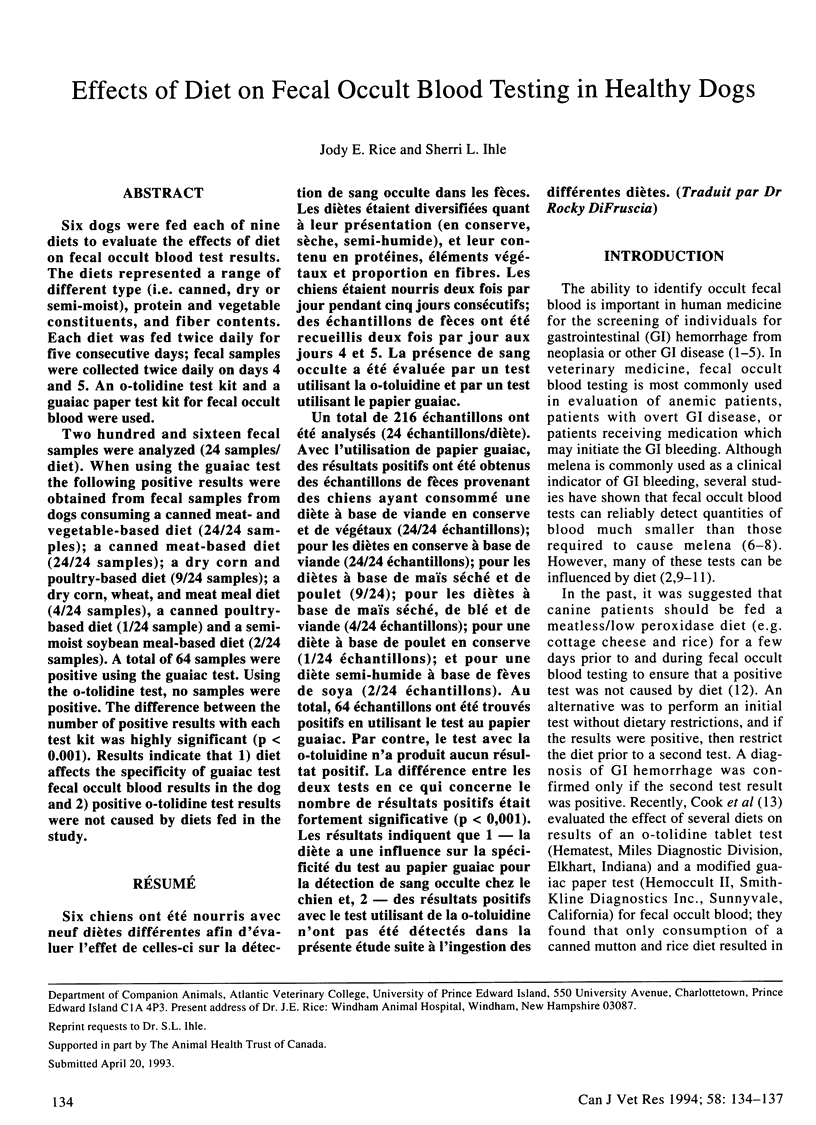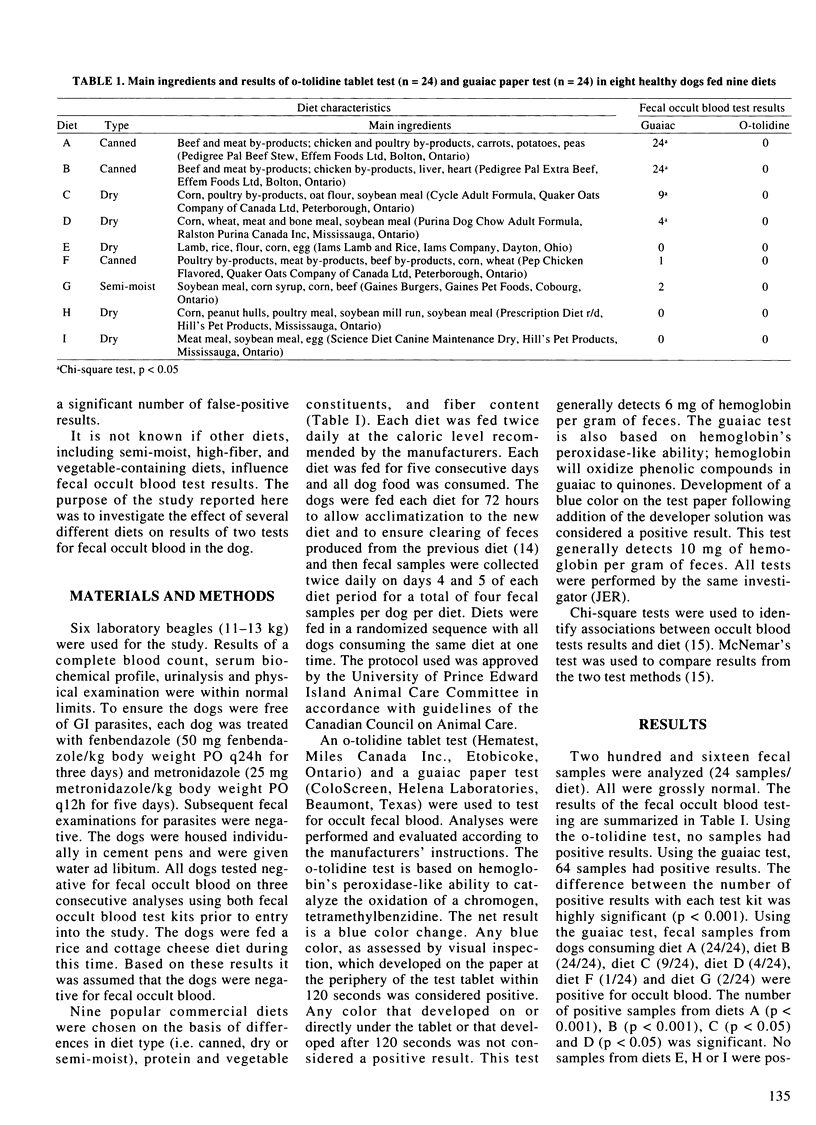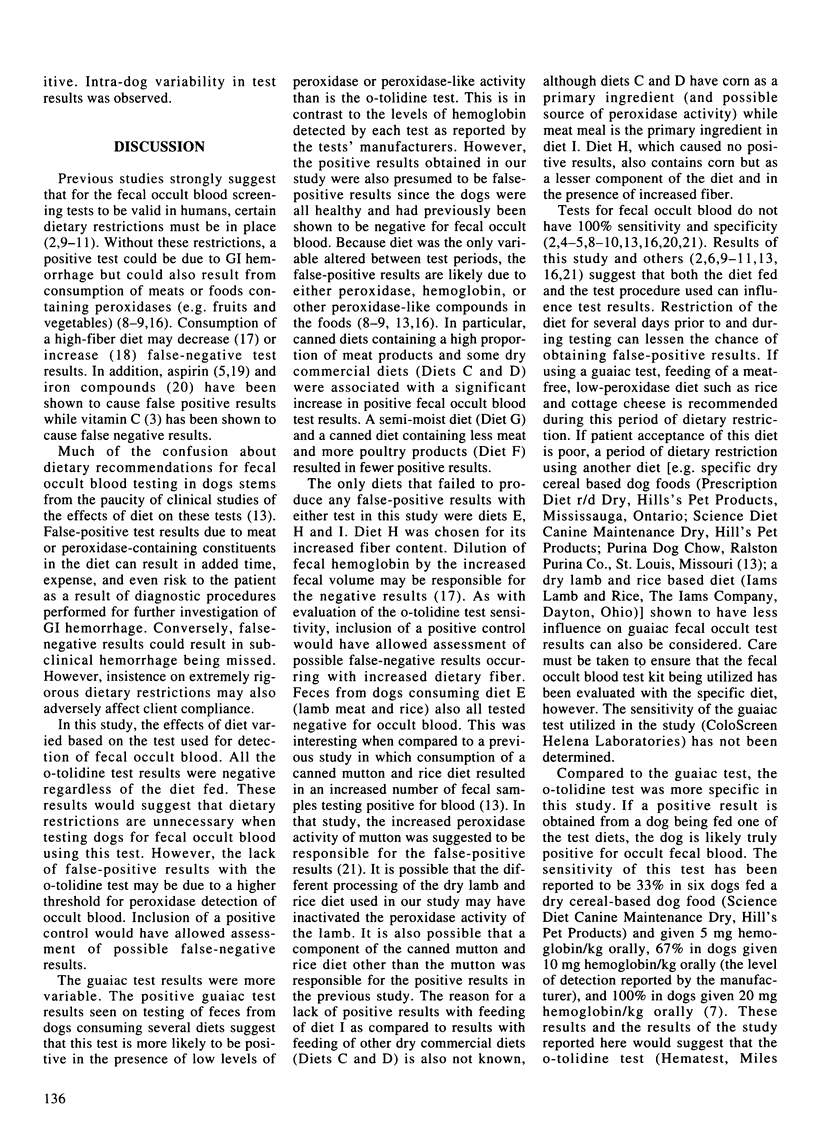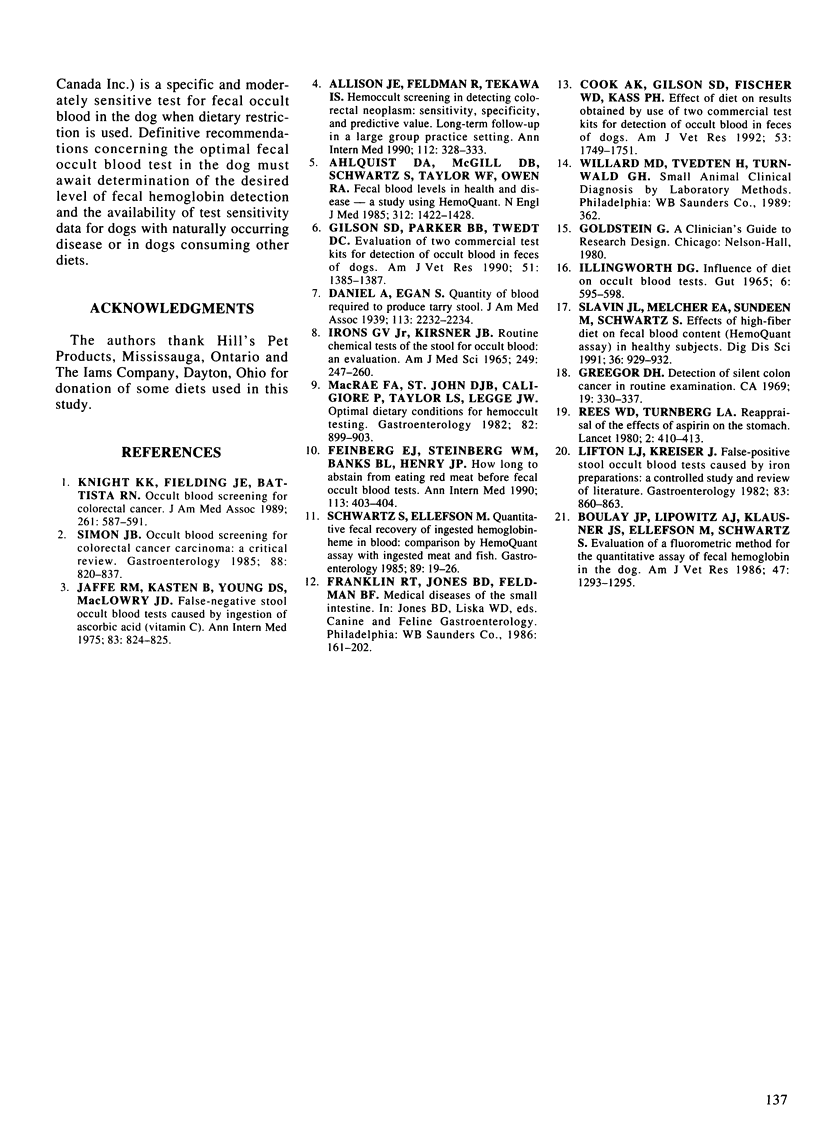Abstract
Six dogs were fed each of nine diets to evaluate the effects of diet on fecal occult blood test results. The diets represented a range of different type (i.e. canned, dry or semi-moist), protein and vegetable constituents, and fiber contents. Each diet was fed twice daily for five consecutive days; fecal samples were collected twice daily on days 4 and 5. An o-tolidine test kit and a guaiac paper test kit for fecal occult blood were used. Two hundred and sixteen fecal samples were analyzed (24 samples/diet). When using the guaiac test the following positive results were obtained from fecal samples from dogs consuming a canned meat- and vegetable-based diet (24/24 samples); a canned meat-based diet (24/24 samples); a dry corn and poultry-based diet (9/24 samples); a dry corn, wheat, and meat meal diet (4/24 samples), a canned poultry-based diet (1/24 sample) and a semi-moist soybean meal-based diet (2/24 samples). A total of 64 samples were positive using the guaiac test. Using the o-tolidine test, no samples were positive. The difference between the number of positive results with each test kit was highly significant (p < 0.001). Results indicate that 1) diet affects the specificity of guaiac test fecal occult blood results in the dog and 2) positive o-tolidine test results were not caused by diets fed in the study.
Full text
PDF



Selected References
These references are in PubMed. This may not be the complete list of references from this article.
- Ahlquist D. A., McGill D. B., Schwartz S., Taylor W. F., Owen R. A. Fecal blood levels in health and disease. A study using HemoQuant. N Engl J Med. 1985 May 30;312(22):1422–1428. doi: 10.1056/NEJM198505303122204. [DOI] [PubMed] [Google Scholar]
- Allison J. E., Feldman R., Tekawa I. S. Hemoccult screening in detecting colorectal neoplasm: sensitivity, specificity, and predictive value. Long-term follow-up in a large group practice setting. Ann Intern Med. 1990 Mar 1;112(5):328–333. doi: 10.7326/0003-4819-112-5-328. [DOI] [PubMed] [Google Scholar]
- Boulay J. P., Lipowitz A. J., Klausner J. S., Ellefson M., Schwartz S. Evaluation of a fluorometric method for the quantitative assay of fecal hemoglobin in the dog. Am J Vet Res. 1986 Jun;47(6):1293–1295. [PubMed] [Google Scholar]
- Cook A. K., Gilson S. D., Fischer W. D., Kass P. H. Effect of diet on results obtained by use of two commercial test kits for detection of occult blood in feces of dogs. Am J Vet Res. 1992 Oct;53(10):1749–1751. [PubMed] [Google Scholar]
- Feinberg E. J., Steinberg W. M., Banks B. L., Henry J. P. How long to abstain from eating red meat before fecal occult blood tests. Ann Intern Med. 1990 Sep 1;113(5):403–404. doi: 10.7326/0003-4819-113-5-403. [DOI] [PubMed] [Google Scholar]
- Gilson S. D., Parker B. B., Twedt D. C. Evaluation of two commercial test kits for detection of occult blood in feces of dogs. Am J Vet Res. 1990 Sep;51(9):1385–1387. [PubMed] [Google Scholar]
- Greegor D. H. Detection of silent colon cancer in routine examination. CA Cancer J Clin. 1969 Nov-Dec;19(6):330–337. doi: 10.3322/canjclin.19.6.330. [DOI] [PubMed] [Google Scholar]
- IRONS G. V., Jr, KIRSNER J. B. ROUTINE CHEMICAL TESTS OF THE STOOL FOR OCCULT BLOOD: AN EVALUATION. Am J Med Sci. 1965 Mar;249:247–260. doi: 10.1097/00000441-196503000-00001. [DOI] [PubMed] [Google Scholar]
- Illingworth D. G. Influence of diet on occult blood tests. Gut. 1965 Dec;6(6):595–598. doi: 10.1136/gut.6.6.595. [DOI] [PMC free article] [PubMed] [Google Scholar]
- Jaffe R. M., Kasten B., Young D. S., MacLowry J. D. False-negative stool occult blood tests caused by ingestion of ascorbic acid (vitamin C). Ann Intern Med. 1975 Dec;83(6):824–826. doi: 10.7326/0003-4819-83-6-824. [DOI] [PubMed] [Google Scholar]
- Lifton L. J., Kreiser J. False-positive stool occult blood tests caused by iron preparations. A controlled study and review of literature. Gastroenterology. 1982 Oct;83(4):860–863. [PubMed] [Google Scholar]
- Macrae F. A., St John D. J., Caligiore P., Taylor L. S., Legge J. W. Optimal dietary conditions for hemoccult testing. Gastroenterology. 1982 May;82(5 Pt 1):899–903. [PubMed] [Google Scholar]
- Rees W. D., Turnberg L. A. Reappraisal of the effects of aspirin on the stomach. Lancet. 1980 Aug 23;2(8191):410–413. doi: 10.1016/s0140-6736(80)90452-3. [DOI] [PubMed] [Google Scholar]
- Schwartz S., Ellefson M. Quantitative fecal recovery of ingested hemoglobin-heme in blood: comparisons by HemoQuant assay with ingested meat and fish. Gastroenterology. 1985 Jul;89(1):19–26. doi: 10.1016/0016-5085(85)90740-1. [DOI] [PubMed] [Google Scholar]
- Simon J. B. Occult blood screening for colorectal carcinoma: a critical review. Gastroenterology. 1985 Mar;88(3):820–837. doi: 10.1016/0016-5085(85)90158-1. [DOI] [PubMed] [Google Scholar]
- Slavin J. L., Melcher E. A., Sundeen M., Schwartz S. Effects of high-fiber diet on fecal blood content (HemoQuant assay) in healthy subjects. Dig Dis Sci. 1991 Jul;36(7):929–932. doi: 10.1007/BF01297143. [DOI] [PubMed] [Google Scholar]


